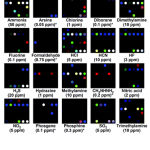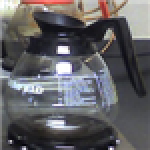coffee
Many are the "alternative" medicine therapies that I've examined with a skeptical eye over the years. The vast majority of them rest on concepts that range from pre-scientific to religious to outright pseudoscientific to—let's face it—the utterly ridiculous. Examples abound: Reflexology, reiki, tongue diagnosis, homeopathy, ear candling, cupping, crystal healing, urine drinking, detoxifying foot pads, "detox foot baths," and the like. The list goes on.
Of these, one of the most amazingly silly and ridiculous alternative therapies of them all, if not the most ridiculous—although, to be fair,…
Image from The Telegraph (www.telegraph.co.uk Photo credit: Alamy)
Granted this is not comparative physiology, I thought this study was really interesting.
Research has shown that exposure of developing embryos to caffeine in utero can alter the expression of genes in the heart leading to changes in how the heart develops and functions in adult animals. New research from the University of Florida published in the American Journal of Physiology - Regulatory, Integrative and Comparative Physiology has examined changes in specific genes they believe are altered by physiologically-…
Guest Blog by Diane Bock
The Age of Enlightenment is associated with intellectual exchange, reason and sharing of the new ideas. We think of names like Isaac newton, Thomas Jefferson and John Locke. Could this new way of thinking also be connected with coffee?
During this period the coffee house emerged as a social center. People from all walks of life mixed and mingled and pollinated each others' ideas. They also started consuming buckets of coffee while moving away from swilling beer morning, noon and night. Prior to that, beer was the safest beverage…
The evidence from real-world observations, sophisticated computer models, and research in hundreds of different fields continues to pile up: human-caused climate change is already occurring and will continue to get worse and worse as greenhouse-gas concentrations continue to rise.
Because the climate is connected to every major geophysical, chemical, and biological system on the planet, it should not be surprising that we are learning more and more about the potential implications of these changes for a remarkably wide range of things. And while it is certainly possible – even likely – that…
Your morning caffeine fix is but a drop in the global bucket that makes coffee the number two most traded commodity in the world after petroleum. But with 100 million Americans like you drinking coffee every day, the bucket easily overflows to make the US the world’s top coffee consumer...
Courtesy of: Online Finance News by Financesonline.com
Click on the graphic to visit the source.
Choose what the VLT observes - public vote on a science target one night this autumn
Ralph Cicerone Public Lecture - Contemporary Climate Change as Seen through Data - video of Ralph Cicerone lecture on Climate Change at the Aspen Center for Physics this summer
Cliff at Asymptotia summarises the "Future of Physics" public symposium at the Aspen Center for Physics.
With bonus pics of physicists gone wild!
How did I miss this?! - the Definitive Dunkin' Donuts study on which professions need coffee the most...
"scientists/lab technicians are the professions that need coffee the most,…
I don't drink much coffee. So the news that some coffee producers are finding it tough to deal with changes in growing conditions that could be an early taste of what global warming will bring doesn't strike close to home. And of course, "scientists are uncertain whether the peculiar weather patterns in the area are directly related to warming."
Still, what if the fears are warranted? Is "peak coffee" around the corner? Given how much coffee Americans guzzle, I wonder what would happen if prices started spiking -- just as they are about to do with the another habit-forming commodity.
Researchers at the University of Illinois, Urbana-Champaign have developed a way to compare aromas visually using specially developed inks.
Kenneth Suslick and his colleagues used tiny squares of polymer film that hold 36 drops of carefully designed dyes. These pigments change colour when exposed to various chemicals. The result is a cheap system for detecting very low concentrations of gaseous compounds. The cards can be used like a physicist's radiation dose badge to alert lab workers when they have been exposed to toxic gases.
As shown above, the cards can be used to give each…
Or, to give the full title: "How to brew beer in a coffee maker, using only materials commonly found on a modestly sized oceanographic research vessel". The marine scientists at Southern Fried Science have this handy guide to any scientist unfortunate enough to find themselves high and dry whilst out collecting data:
You're six days into a 2 month expedition, and if you were lucky enough to not be on a dry ship, it's de facto dry by now anyway. You're eying the ethanol stores, the crew is eying each other, and all hell will break loose if y'all don't get some sweet water soon. This is no…
Friday morning was really, really cold (for North Carolina), so what better way to start off ScienceOnline09 than at Counter Culture Coffee where about 25 or so participants (and several other people - this is an open event) showed up bright and early to learn about the science (and business) of coffee.
Coffee is one of those things that you just drink, unthinkingly, at the time of the morning when it is hard to think anyway. So this was quite an eye-opener - learning what happens between the moment the coffee plant is planted and the moment when you taste the coffee. And there are many…
Coffee grounds may be able to provide energy beyond the caffeine buzz most drinkers seek, according to a study appearing this week in the Journal of Agricultural and Food Chemistry. The study's authors claim that the oil contained in grounds, when extracted, could produce as much as 340 million gallons of biodiesel per year. ScienceBlogger Greg Laden ponders what will happen when coffee goes to make diesel instead of lattes.
tags: researchblogging.org, coffee, memory, cognition, women, aging
Recent research has shown that women older than 65 years old who drink more than three cups of coffee per day were protected from some types of age-related memory declines.
"The more coffee one drank, the better the effects seemed to be on (women's) memory functioning in particular," reported Karen Ritchie, epidemiological and clinical researcher at La Colombiere Hospital and at the French National Institute of Medical Research (INSERM), in Montpellier, France.
To do this research, the researchers studied more than 4,197…





